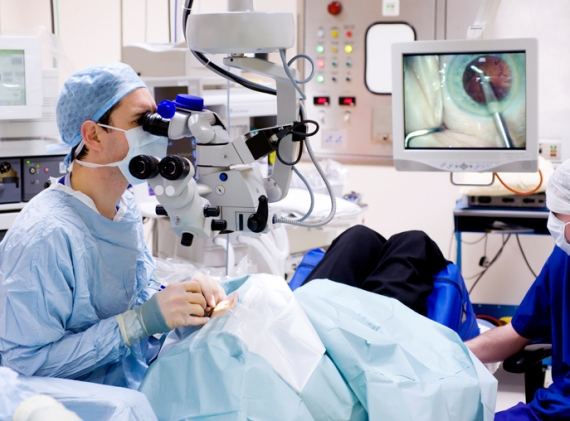Cataract Surgery Intraocular Lens
Cataract surgery is often an inevitable part of the aging process, but you will find the best cataract specialists at Elmquist Eye Group. We are pleased to offer the revolutionary bladeless laser-assisted cataract procedure and the latest advancements in intraocular lens technology.

Elmquist Eye Group has provided exceptional eye care to the residents of Southwest Florida for more than 25 years. Yasaira Rodriguez, MD is a board certified ophthalmologist and refractive surgeon who specializes in premium cataract surgery and eyelid surgery.
Types of Intraocular Lenses
Cataracts are treated by surgically removing the cloudy natural lens and replacing it with a clear artificial lens, called an intraocular lens or IOL. Unlike a contact lens, it is placed permanently inside the eye. It cannot fall out, does not require cleaning, and you will not even notice that it’s there.
Today, there are several options when it comes to intraocular lenses. Your eye doctor will help you decide which lenses may be right for you. The four main types are:
- Monofocal–A monofocal lens is a one-distance lens. It is the most basic of the available IOLs and is covered by Medicare and most health insurance plans. With a monofocal lens, you may be able to drive without needing glasses, but most people require glasses for distance, intermediate and near vision, such as for working on a computer or reading a book.
- Multifocal–If being less dependent on glasses is one of your goals, consider multifocal lenses. These new-technology IOLs correct for all distances and give you good near and far vision. One drawback is that you may experience halos around lights when driving at night, but it diminishes over time and most patients are not significantly bothered by it.
- Toric– You may be a candidate for the Toric lens if you have astigmatism (an irregularly shaped cornea). Unlike eyeglasses, standard IOLs cannot correct astigmatism. For this reason, the more astigmatism you have, the more dependent you would be on eyeglasses even after cataract surgery.
No single type of lens is best for every patient, and your surgeon’s experience with each of these lenses will play an important part in obtaining the right lens for your eyes.
Dr. Rodriguez will do additional testing before surgery and, with input from you about your lifestyle and preferences, will help you determine the appropriate IOL for your unique eyes.
Cataract surgeon Yasaira Rodriguez, MD at Elmquist Eye Group is among the best qualified in Southwest Florida. For answers to your questions about surgery and intraocular lenses, get in touch with us today at (239) 936-2020 and schedule an appointment. The Elmquist team will be delighted to help.
